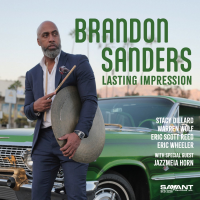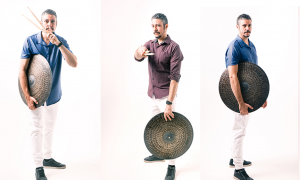Home » Jazz Articles » Interview » Jimmy McGriff: Nobody Else But Himself
Jimmy McGriff: Nobody Else But Himself
I play where I wanna play and I feel what I wanna play. I don
 For two evenings in April, Philadelphia-born Jimmy McGriff celebrated his 70th birthday with a gala gig at New York's Smoke. Wearing a cap reminiscent of the Beatles era, his bulky six-foot frame hunched over the organ, he radiated the intense concentration of a friendly Sumo wrestler. A professional musician since his early teens, he'd evolved firmly into his own groove by the 1970s. Some have labeled his music "acid jazz, but whatever it's called, McGriff knows what he's aiming for, and he's played it through the years in company with artists as disparate as Hank Crawford, Miles Davis, Lucky Thompson, Blue Mitchell and Eric Alexander. On May 4, 2006 he will likely be wearing one of his many hats when joins an all-star lineup, performing for the Jazz Foundation of America's 5th Annual A Great Night in Harlem concert, which will be hosted by Bill Cosby. In conversation he's a master of a good-natured and eloquent "yup.
For two evenings in April, Philadelphia-born Jimmy McGriff celebrated his 70th birthday with a gala gig at New York's Smoke. Wearing a cap reminiscent of the Beatles era, his bulky six-foot frame hunched over the organ, he radiated the intense concentration of a friendly Sumo wrestler. A professional musician since his early teens, he'd evolved firmly into his own groove by the 1970s. Some have labeled his music "acid jazz, but whatever it's called, McGriff knows what he's aiming for, and he's played it through the years in company with artists as disparate as Hank Crawford, Miles Davis, Lucky Thompson, Blue Mitchell and Eric Alexander. On May 4, 2006 he will likely be wearing one of his many hats when joins an all-star lineup, performing for the Jazz Foundation of America's 5th Annual A Great Night in Harlem concert, which will be hosted by Bill Cosby. In conversation he's a master of a good-natured and eloquent "yup. All About Jazz: Both of your parents were pianists.
Jimmy McGriff: Yes, I was playing when I was five. I played piano. I didn't take lessons. I just did it. ...I played the saxophone. And I played the bass for pennies.
AAJ: What made you turn to the organ?
JM: Well, the church really turned me on to that. I just started hitting around on it. I played some gospel, but that wasn't the thing. I just got interested in that sound.
AAJ: When did you know that the organ was your instrument?
 JM: Well, I can't really tell you that. I know it was real early, but I don't know exactly what made me turn. It was around six or seven. [Pausing] My father was the one. He turned me around from playing the piano to the organ. I don't know. He was hearing something I wasn't hearing. He told me to play the organ, because I had that gospel thing.
JM: Well, I can't really tell you that. I know it was real early, but I don't know exactly what made me turn. It was around six or seven. [Pausing] My father was the one. He turned me around from playing the piano to the organ. I don't know. He was hearing something I wasn't hearing. He told me to play the organ, because I had that gospel thing.
AAJ: And you also studied with Groove Holmes.
JM: Yup. He was fun to play with. Oh yeah. I enjoyed it a lot. He was a very funny guy. We got along good. He said a lot of things that made me laugh. He was fat and he was funny. He played both piano and organ and I played piano. But I would switch with him and play organ. I enjoyed it a lot.
AAJ: And before long your were already playing gigs.
JM: Well, I played most of the clubs like Showboat and Haps. I was just messing around with the music. I played with Big Maybelle. She was alright. She loved to drink. She'd say, "Come on and play something. And I played a couple of things.
AAJ: How old were you then?
JM: About fifteen. Yeah, I wasn't old enough to be in the club. I was new to the clubs and they were new to me.
AAJ: Soon after that you studied at Julliard in New York for a year.
JM: That was a wonderful place to go. It was good to me. It was like a kid going to school for the first time and learning something for the first time. I learned the chord changes and things like that.
AAJ: Were you close to any of the other students?
JM: Oh yeah. Jackie Mills, he was a drummer. We worked together a lot. He lives down south somewhere now. And I was working with Buddy Rich.
AAJ: At Julliard?
JM: No, I was working with him all over.
AAJ: So you were in school and already a real working pro at sixteen. What was Rich like to work with?
 JM: (chuckles) He was alright. ...He was kinda hard to get along with sometimes. I didn't have that kind of trouble. I got along with him because I played the kind of music he wanted and he played what I liked. So that was alright.
JM: (chuckles) He was alright. ...He was kinda hard to get along with sometimes. I didn't have that kind of trouble. I got along with him because I played the kind of music he wanted and he played what I liked. So that was alright.
AAJ: In what way was he difficult?
JM: There were things he would say and he knew I didn't like 'em. But I let 'em go. I'd just pass 'em up. You know, about black and white.
AAJ: I'm shocked to hear that.
JM: [chuckles]
AAJ: Andy Bey said something to me recently about race still being an issue in the music business. Do you agree?
JM: Yeah. Well, it's not there as much, but it's there. You can't help it. It's there!
AAJ: Did it ever come up in your work, say in recording?
JM: Yeah. The Starting Five (Milestone, 1986). It took me a while to get that session going because I had a white guy there who going to tell me how to play the colored music. And I laughed and I said, "What you say?
AAJ: Who was that?
JM: Sonny Lester. [Note: Lester was the mastermind producer and A&R man behind Solid State and Groove Merchant, for which McGriff recorded extensively].
AAJ: So you set him straight.
JM: Oh yeah.
AAJ: Sometimes it almost sounds like a trumpet tone when you play. Would you agree and how do you get that?
JM: Well, with the organ you can get a lot of tones, but you just have to pick out which one you want. I liked that trumpet kind of sound. That's what I was looking for.
AAJ: Let's talk about some other organ players. Ones you've liked and who influenced you.
JM: Oh, I liked Shirley Scott. She played that big band kind of thing that I was after. ....she was alright. I got along good with her. Reuben Wilson and [Dr.] Lonnie Smith are very good. They are aware of playing and that's good.
AAJ: And Jimmy Smith? She and Scott were both also from Philadelphia like you.
JM: Yeah, I liked him. He was strictly a jazz organ man. I was a blues organ. That was the difference between the two of us. ...and there was a woman there. I can't remember her name. She could play gospel, but she could play it all. She was kinda doing what I was trying to do, which was play a big band kinda thing. ...The blues, it's hard to explain. All of it comes right out of the church.
AAJ: When you were growing up and studying, whose music was really special for you?
 JM: Count Basie. It was big band music. And I liked that big band kinda thing. That's what turned me on. ...Later I got to work with him. He had a club in New York, Count Basie's. And I used to go in and he would say, "Come on, let's play something. He was the father of Harlem musicians. He wouldn't teach you nothing wrong. If you did something wrong, the changes I would play, he would just say, "That's wrong. You don't wanna do that. So that was good. I liked that.
JM: Count Basie. It was big band music. And I liked that big band kinda thing. That's what turned me on. ...Later I got to work with him. He had a club in New York, Count Basie's. And I used to go in and he would say, "Come on, let's play something. He was the father of Harlem musicians. He wouldn't teach you nothing wrong. If you did something wrong, the changes I would play, he would just say, "That's wrong. You don't wanna do that. So that was good. I liked that.
AAJ: That big band sound is what you really love. What about when you added a synthesizer and you toured with Hank Crawford? You worked with him a lot and together made a big band.
JM: He has the sound I was trying to get on the organ. He had it on the horn so I was able to get it more with him. He's not the easiest person to get along with, but I like him. He has his own playing, just like everybody has their own way. I have mine and he has his. It was easy for me because I would play something and then I would ask him, "how do ya like that? And he said, "That's alright.
AAJ: Structure is very strong in your music.
JM: Yup. Well, my father played the piano and that's the first thing. And I just copied that. I learned that from him really.
AAJ: When you listen to music at home now, whom do you listen to?
 JM: I listen to a lot of different people because you get new ideas. Miles Davis. The tune called "Walkin'. It had the big band style plus that kind of feeling it gives you. I worked with Miles in '65. It was a good experience for me 'cause I was just coming out and doing the thing I wanted. He accepted me and I accepted him. So that's a good feelin'. And by him being a trumpet player, that was on top of the list. Because the big band was known to have that thing, the trumpet.
JM: I listen to a lot of different people because you get new ideas. Miles Davis. The tune called "Walkin'. It had the big band style plus that kind of feeling it gives you. I worked with Miles in '65. It was a good experience for me 'cause I was just coming out and doing the thing I wanted. He accepted me and I accepted him. So that's a good feelin'. And by him being a trumpet player, that was on top of the list. Because the big band was known to have that thing, the trumpet.
AAJ: You're going to playing in the big 5th Annual Jazz Foundation of America benefit, at the Apollo on May 4th. Clark Terry, Abbey Lincoln, Harold Mabern, Gary Bartz and so many others are going to be there too. What will you be playing there?
JM: Everybody you named I've worked with. Clark Terry ...I love. I don't know. I'll wait 'til I go on and just feel it. I'll be playing with a group.
AAJ: You've made so many dozens of recordings. Some great ones aren't in print, like a lot of the Blue Note sessions. It must be frustrating for you.
JM: Very! Most of the stuff I did with Blue Note I liked. I'm not the kind of person...they have some people they "cling to and some people who are just "there. (Chuckling) I was just... "there. That's all.
AAJ: What would you like people to know about you?
JM: I'd like them to know that I play where I wanna play and I feel what I wanna play. I don't try to be nobody else. I'm me. I always did it that way.
Selected Discography
Jimmy McGriff, McGriff Avenue (Fantasy, 2004)
Jimmy McGriff, Feelin' It (Milestone-Fantasy, 2000)
Jimmy McGriff/Hank Crawford, Right Turn on Blue (Telarc, 1994)
Buddy Rich, The Last Blues Album (Vol.1) (Groove Merchant, 1974)
Jimmy McGriff, Live at Cook County Jail (Groove Merchant, 1972)
Jimmy McGriff, The Worm (Solid State-Blue Note, 1968)
Jimmy McGriff, I Got A Woman (Sue-Collectables, 1962)
Photo Credits:
Top Photo: Mark Sheldon
Bottom Photo: Atael Weissman
Tags
PREVIOUS / NEXT
Support All About Jazz
 All About Jazz has been a pillar of jazz since 1995, championing it as an art form and, more importantly, supporting the musicians who make it. Our enduring commitment has made "AAJ" one of the most culturally important websites of its kind, read by hundreds of thousands of fans, musicians and industry figures every month.
All About Jazz has been a pillar of jazz since 1995, championing it as an art form and, more importantly, supporting the musicians who make it. Our enduring commitment has made "AAJ" one of the most culturally important websites of its kind, read by hundreds of thousands of fans, musicians and industry figures every month.

























